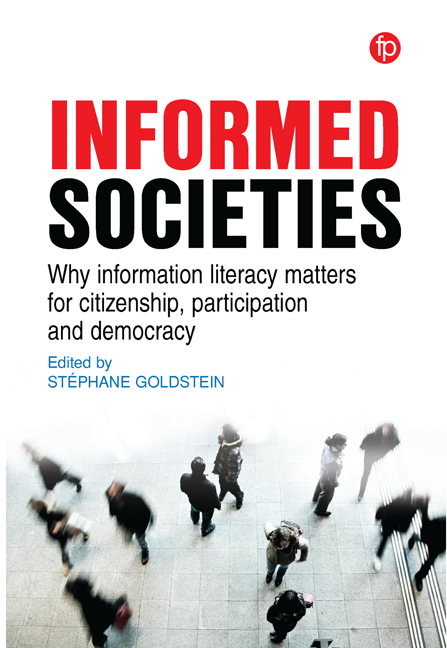Book contents
- Frontmatter
- Contents
- Figures and Tables
- Notes on the authors
- Foreword
- Introduction
- 1 Information Literacy in the Digital Age: Why Critical Digital Literacy Matters for Democracy
- 2 The Discourses of Power, Information and Literacy
- 3 What Intellectual Empathy Can Offer Information Literacy Education
- 4 The ‘Post-Truth’ World, Misinformation, and Information Literacy: a Perspective From Cognitive Science
- 5 Media and Information Literacy: Intersection and Evolution, a Brief History
- 6 Information Literacy and National Policy Making
- 7 Information Literacy as a Growth Pillar for a Fledgling Democracy
- 8 Information literacy and the Societal Imperative of Information Discernment
- 9 Libraries and Democracy: Complementarity in a Regime of Truth
- 10 Scottish Public Libraries Welcome Syrian New Scots: a Transition from Being a Refugee to Becoming an Active Part of the Community
- 11 Information Literacy, Lifelong Learning and the Needs of an Ageing Population
- Index
4 - The ‘Post-Truth’ World, Misinformation, and Information Literacy: a Perspective From Cognitive Science
Published online by Cambridge University Press: 22 February 2020
- Frontmatter
- Contents
- Figures and Tables
- Notes on the authors
- Foreword
- Introduction
- 1 Information Literacy in the Digital Age: Why Critical Digital Literacy Matters for Democracy
- 2 The Discourses of Power, Information and Literacy
- 3 What Intellectual Empathy Can Offer Information Literacy Education
- 4 The ‘Post-Truth’ World, Misinformation, and Information Literacy: a Perspective From Cognitive Science
- 5 Media and Information Literacy: Intersection and Evolution, a Brief History
- 6 Information Literacy and National Policy Making
- 7 Information Literacy as a Growth Pillar for a Fledgling Democracy
- 8 Information literacy and the Societal Imperative of Information Discernment
- 9 Libraries and Democracy: Complementarity in a Regime of Truth
- 10 Scottish Public Libraries Welcome Syrian New Scots: a Transition from Being a Refugee to Becoming an Active Part of the Community
- 11 Information Literacy, Lifelong Learning and the Needs of an Ageing Population
- Index
Summary
The Party told you to reject the evidence of your eyes and ears. It was their final, most essential command.
(George Orwell, 1984)Just remember, what you’re seeing and what you’re reading is not what's
happening.
(Donald Trump, 24 July 2018)Introduction
There has been increasing concern with the growing infusion of disinformation, or ‘fake news’, into public discourse. Fact-checkers have reported that Donald Trump has been making more than six false or misleading statements every day during his term in office thus far. This chapter explores three questions that arise from this situation:
1 Is disregard for the truth really an acceptable hallmark of contemporary politics? If so, how is this possible and what factors contributed to this state of affairs? I review research that shows how among partisans, endorsement of a politician has become decoupled from his or her perceived veracity. This may reflect disenchantment with the current political system and its ‘elite’.
2 What are the political and psychological consequences of the ‘post-truth’ world? I survey the many findings that suggest that, once acquired, misinformation ‘sticks’ in memory and is difficult to dislodge. In addition to those direct consequences of misinformation, it has indirect fallouts that may undermine the democratic process.
3 What is the appropriate response to this situation? I review the difficulties associated with debunking misinformation and suggest instead that ‘inoculating’ people against misinformation before it is presented is a more successful strategy. I contrast psychological approaches with the idea of ‘technocognition’, which blends findings from cognitive science with the design of information architectures that are more resilient to the spreading of misinformation.
‘Post-truth’ was nominated word of the year by Oxford dictionaries in 2016, to describe ‘circumstances in which objective facts are less influential in shaping public opinion than appeals to emotion and personal belief ‘. A year later, Collins dictionaries declared ‘fake news’ to be the next word of the year, to refer to ‘false, often sensational, information disseminated under the guise of news reporting’. The concern with truth – or indeed its absence – was largely triggered by two political events in 2016 that had global ramifications and that arguably involved an unprecedented extent of deception and misinformation: the Brexit referendum in the UK and the election of Donald Trump in the USA.
- Type
- Chapter
- Information
- Informed SocietiesWhy information literacy matters for citizenship, participation and democracy, pp. 69 - 88Publisher: FacetPrint publication year: 2019
- 10
- Cited by

